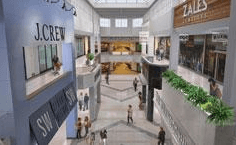Oct 5 2016
Architecture Design Collaborative's mobile design studio was born out of necessity. The California-based firm, which also has an office in the Denver area, wanted to compete with established designers in other markets. How could it add extra services without opening new offices or increasing costs?
 ADC's ability to work on redevelopment designs on site with its client resulted in these plans for renovations now being completed at Perimeter Mall in Atlanta.
ADC's ability to work on redevelopment designs on site with its client resulted in these plans for renovations now being completed at Perimeter Mall in Atlanta.
https://www.naiop.org/en/Magazine/2016/Fall-2016/Business-Trends/Mobile-Design-Studio.aspx
The solution is essentially a design charrette that can be held on-site anywhere in the U.S. The concept has taken ADC a few years to perfect, but today it is being used with much success. The typical mobile design studio (MDS) setup includes three portable workstations, monitors, a combination printer/scanner, survey equipment and Wi-Fi hot spots. All of these are safely packed into two fiberglass hard-shell cases protected with molded foam insulation, which are either shipped to the project site or taken on flights by team members as checked luggage. The packed cases are roughly 20 by 30 by 40 inches large, and weigh about 80 pounds each. Team members carry on additional items in their design arsenal -- Microsoft Surface Books, Apple iPads and sketching supplies -- just in case the kits are lost or delayed in shipping. (This, unfortunately, has happened.)
The MDS offers many benefits compared to the traditional design process. Generally, designers make an initial site visit, then return to their offices to start conceptual designs. Days or weeks later, they take those designs to their clients for review and approval. ADC's technique has streamlined this traditional approach and eliminated many of its shortcomings.
The process works as follows. ADC's designers:
- Fly to the project location.
- Visit competing properties prior to meeting with the client.
- Meet with the client in the morning to discuss the client's objectives, market research and preferences.
- Begin making conceptual design sketches.
- Present initial design concepts over lunch.
- Rework designs.
- Present revised designs and get client feedback at an evening presentation.
- Work well into the evening, incorporating client feedback and finishing designs for the next morning's presentation.
- Repeat as needed.
Depending on the size and complexity of the project, this process generally takes from two to five days before it results in an approved design concept.
Being on-site eliminates many of the issues and delays involved in working with clients from a distance. All projects suffer from a variety of glitches: missed photos, measurements that don't add up, opinions that weren't voiced. The MDS approach results in an open dialog among clients and teammates that enables them to immediately consider and vet any potential "what if" scenarios. ADC's ability to work on redevelopment designs on-site with its client resulted in these plans for renovations now being completed at Perimeter Mall in Atlanta.
For the Perimeter Mall renovation project in Atlanta, for example, the client asked, "What if we make this wing of the mall look more like an outdoor lifestyle center rather than a typical mall?" ADC's designers loved the idea, and being on-site allowed them to take photographs of the wing, create 3-D models and produce sketches to bring the client's vision to life.
Using the MDS allows designers to be more efficient and reduces turnaround times dramatically. Clients are more closely involved in the design process, resulting in instant feedback, occasional redirection and faster client approvals. During the Perimeter Mall design charrette, ADC presented new facade treatments, but the client wasn't convinced. So, overnight, designers sketched another four concepts for the client to review over breakfast. In this case, the client agreed that the original concept was actually the best. ADC's quick exploration of additional ideas allowed the client to come to a more informed decision.
ADC team members always ask clients to use strong words like "love it," "hate it," "brilliant" and "stupid"; any language is acceptable, as long as it gets to the root of their feelings. While ADC was presenting one project, the client, who was new to this experience, found himself blurting out "I love it" too often. When designers presented options for the facade treatment and he yelled "I hate it," everyone laughed. Designers find that this process brings them closer to their clients, which pays dividends for all.
It is just as important to nail down an approved concept as it is to get construction documents and other details right. Having a clear concept, and getting answers to as many questions as possible, as early as possible, is key to an efficient design process. Designers waste less of their own time, and less of the client's money.
Today, ADC is using the MDS all over the country for retail, residential, mixed-use and office projects; it currently has active projects in 20 states. Once clients experience the MDS, they ask for it more often than not.
About Architecture Design Collaborative
Architecture Design Collaborative (ADC) is a top 35 Architecture Firm servicing clients nationwide offering multi-disciplinary architectural, planning and interior design services. ADC currently has active projects in 20 states specializing in retail, residential, mixed use and commercial projects. Collectively the team brings a wide range of expertise across many design related disciplines including architecture, interior design, master and urban planning, and brand strategy.
Source: https://adcollaborative.com/